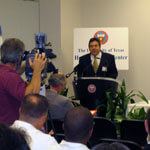
A new neurosurgery residency program at the Health Science Center has begun educating resident physicians in the intricacies of the branch of surgery dealing with the brain, spine and nerves.
David F. Jimenez, M.D., FACS, professor of neurosurgery and director of The Center for Neurosurgical Sciences in the Medical School, made the announcement July 18 at a press conference at the Health Science Center. Health Science Center President Francisco G. Cigarroa, M.D.; Thomas C. Mayes, M.D., MBA, interim dean of the Medical School; and George B. Hernandez Jr., president and chief executive officer of the University Health System, also spoke.
The Health Science Center’s first neurosurgery residency program was launched in 1973 and had a proud history of educating neurosurgeons. The program was placed on inactive status in 2003 after the departure of most faculty neurosurgeons. The new program supersedes it.
“We last called you together when we had a challenge in this community with neurosurgery,” Dr. Mayes said. “We are here today to say that we have met this challenge.”
“Neurosurgery is a discipline of the highest order,” President Cigarroa told reporters. “The establishment of a new neurosurgery residency program could not have been done without the tremendous support of the University Health System.” He also thanked military surgeons who enabled neurosurgery coverage at University Hospital to continue while the residency program was being re-established.
The Residency Review Committee of the Accreditation Council for Graduate Medical Education (ACGME) accepted the neurosurgery residency program as a new program effective July 1, said Dr. Jimenez, who joined the faculty in June 2004. “It is a pleasure to tell you what we have accomplished in one year,” he said. “The ACGME accepted us as a new program, which is a very difficult thing to achieve. On July 1 we started with two great residents. This is a great community in which to live and work. They [the Health Science Center and University Health System] made a true commitment to neurosurgery and they have come through. If we have accomplished this much in just 12 months, imagine what will be done in five to 10 years.”
Factors that curtailed the former program included a consistently large neurosurgical trauma caseload at University Hospital, the Health Science Center’s teaching hospital. The repetition of the trauma cases did not provide time for the challenging and rare non-trauma cases for which neurosurgery faculty had spent so many years preparing.
The Health Science Center and UHS acted quickly to make changes. Dr. Jimenez, a renowned neurosurgeon known for minimally invasive surgery to help babies born with the skull abnormality craniosynostosis, was recruited from the University of Missouri in 2004 to become professor and director of The Center for Neurosurgical Sciences, a new center in the Health Science Center Medical School.
Dr. Jimenez has hired several new faculty members to form The Center for Neurosurgical Sciences. The five full-time faculty are Dr. Jimenez; Jean-Louis Caron, M.D., professor; Giacomo Vecil, M.D., assistant professor; Roman Hlatky, M.D., assistant professor; and Yuchuan Ding, M.D., Ph.D., associate professor and director of research laboratories. Franklin Epstein, M.D., of the South Texas Veterans Health Care System; Michael Leonard, M.D., private practice; Gerry Grant, M.D., U.S. Air Force; and Keith Preston, M.D., private practice, are clinical faculty.
The Center for Neurological Sciences also relies on physician assistants and nurses whose assistive work with patients enables faculty and residents to concentrate on surgical approaches and other educational interactions.
The Health Science Center and University Health System have committed substantial resources to the program. For example, the Health Science Center provided the faculty research position held by Dr. Ding and has dedicated several laboratories to neurosurgery research.
The Health Science Center, after evaluating what other health science universities have done, already has moved neurosurgery out of general surgery to a center and is committed to making it a department in the Medical School.
University Hospital, a Level I trauma center, needs a residency program in neurosurgery to maintain that status. UHS has committed intensive care unit spaces, operating rooms and clinic space to the program.
“The military kept us on the map, so to speak,” until Dr. Jimenez and the other new faculty could be hired, Hernandez said.
Both President Cigarroa and Hernandez discussed the Health Science Center/UHS partnership that proved strong in a time of challenge.
The neurosurgery residency program’s bright future perhaps was best exemplified by the presence of three residency applicants at the press conference. Dr. Jimenez plans to fill six residency slots in the next year, he said.
The Center for Neurosurgical Sciences offers full neurosurgical clinical services encompassing trauma, vascular conditions, neuro-oncology, epilepsy, spinal surgery and pediatric neurosurgery.
Dr. Jimenez has collaborated with his wife, Constance Barone, M.D., FACS, professor and chief of the division of plastic and reconstructive surgery at the Health Science Center, to pioneer endoscopic surgical intervention for babies born with craniosynostosis. Babies with this condition have elongated heads or bulging foreheads because the skull’s fibrous seams, which usually allow for rapid brain growth in the first two years of life, are prematurely fused. If untreated, the condition causes disfigurement, headaches and other problems.
The minimally invasive endoscopic approach developed by Drs. Jimenez and Barone dramatically reduces pain, blood loss, surgery time, hospital stays and recovery time of these babies. An endoscope is a surgical instrument with a camera on it.

